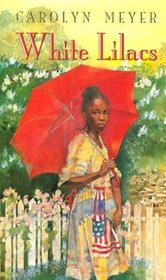Helpful Score: 1
From Publishers Weekly
Based, as the author explains in an endnote, on an event that took place in 1921-22, this somber, moving story focuses on prejudice, injustice and everyday bravery. When the city council of Dillon, Tex., unveils its plans to raze Freedomtown--an all-black enclave in the town's center--and replace it with a park, the proposal unleashes a tumult of rage and defiance in the black community. The Freedomtowners' indignation dwindles down to a trickle of unrest and, eventually, resignation after a Klan cross-burning, the destruction of the local school and several other frightening, dispiriting events. As seen through the eyes of 12-year-old aspiring artist Rose Lee Jefferson, this struggle for equal rights quickly becomes a sorrowful march toward an inevitable eviction. Even Rose Lee's activist older brother--a World War I veteran and follower of Marcus Garvey--fails in his fight against Dillon's privileged class: he is tarred and feathered by local hooligans. Numerous historical details and snippets of then-current political thought are smoothly integrated into the story. Bleak though its conclusion is, this bittersweet novel is poignant and tender, both in its spare vernacular dialogue and delicate description. Ages 8-12.
Based, as the author explains in an endnote, on an event that took place in 1921-22, this somber, moving story focuses on prejudice, injustice and everyday bravery. When the city council of Dillon, Tex., unveils its plans to raze Freedomtown--an all-black enclave in the town's center--and replace it with a park, the proposal unleashes a tumult of rage and defiance in the black community. The Freedomtowners' indignation dwindles down to a trickle of unrest and, eventually, resignation after a Klan cross-burning, the destruction of the local school and several other frightening, dispiriting events. As seen through the eyes of 12-year-old aspiring artist Rose Lee Jefferson, this struggle for equal rights quickly becomes a sorrowful march toward an inevitable eviction. Even Rose Lee's activist older brother--a World War I veteran and follower of Marcus Garvey--fails in his fight against Dillon's privileged class: he is tarred and feathered by local hooligans. Numerous historical details and snippets of then-current political thought are smoothly integrated into the story. Bleak though its conclusion is, this bittersweet novel is poignant and tender, both in its spare vernacular dialogue and delicate description. Ages 8-12.




